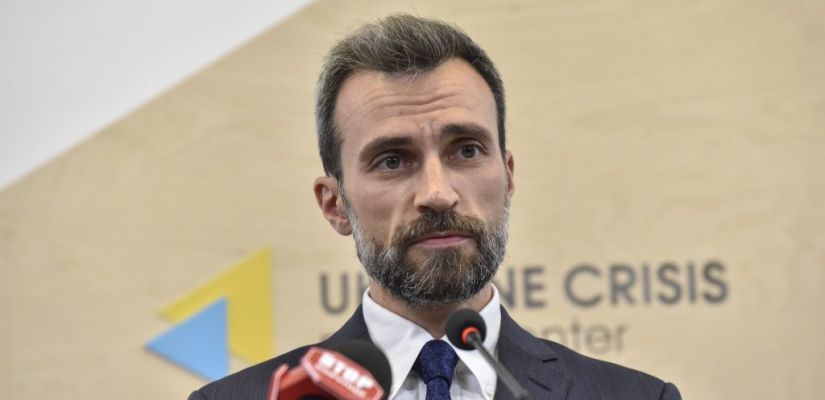Whistle-blower who exposed judicial reform farce in Ukraine dismissed

Andriy Kozlov has been abruptly dismissed from his position on Ukraine’s High Qualification Commission of Judges. Although the official reason has nothing to do with his independent views and hard-hitting criticism, both Kozlov and a large number of NGOs believe the dismissal to have been politically motivated.
The timing certainly looks bad, with the news of Kozlov’s dismissal coming soon a widely-published post on Facebook in which Kozlov accused fellow members of the High Qualification Commission of Judges [HQCJ] of shenanigans to protect morally compromised judges.
HQCJ has been criticized by many civic organizations and lawyers representing Maidan victims for turning a blind eye to numerous judges who actively persecuted Maidan activists or who are suspected of corruption. The Commission is obliged to consider the opinions issued by the far less permissive Public Integrity Council. It can, however, and very often does override, negative assessments of judges’ integrity, however well-founded, if it can muster a two-thirds majority (11 out of 16) in favour of this.
The HQCJ meeting on 12 June began an hour and a half late seemingly because there were only 11 members present and it was generally understood that Kozlov was not likely to vote to override a negative assessment of the judges under consideration. Roman Maselko, a member of the Public Integrity Council, notes that over three days, HQCJ was supposed to consider 51 judges, many of whom had been involved in persecuting Maidan activists, had infringed the rules for declaring income or who had property that was in no way commensurate with their official income.
Maselko asserts that the members specially called another member in order to ensure that 11 voted to override the negative assessments. All went to plan with the first two judges, but then there was a major hitch over judge Inna Hryban who had received a negative assessment for her involvement in measures aimed at blocking peaceful assembly.
That vote did not produce the required two-thirds majority. A decision to declare ‘a break’, which requires only a simple majority in favour, was promptly taken, with this resulting in Kozlov both walking out, and writing about the event on Facebook. Since the lack of a two-third majority should have led to the Council’s negative assessment being heeded and the candidate rejected, this sudden decision to ‘take a break’ was, effectively, a means of falsifying the real outcome of the vote.
Kozlov had been appointed to the Commission as one of the two members in the Human Rights Ombudsperson’s quota. This was under the previous Ombudsperson Valeria Lutkovska, as the result of a competition which was broadcast live, in October 2016, with his four-year term due to run until November 2020.
It was suddenly announced on 27 June that Kozlov had been dismissed from the Commission, officially over doubts as to the length of his professional work experience. The relevant order has reportedly now been submitted to the HQCC. Kozlov has dismissed the grounds given, and provided details which he believes demonstrate their lack of substance. There has been no comment from the current Ombudswoman Lyudmila Denisova despite the considerable publicity over the dismissal and the accusations that the move is politically motivated.
On 2 July, a number of prominent civic organizations involved in judicial and anti-corruption reform issued a statement condemning the decision to dismiss Kozlov. The authors asserted that “the real aim of his dismissal is to remove independent members of HQCC with a principled stand on the evaluation of judges lacking in integrity.
Over the three years since the beginning of the judicial reform, HQCC has demonstrated its unwillingness to carry out a real overhaul of the judiciary. As the result of a qualification assessment of over 2,700 judges only 16 were dismissed for unsuitability for the post. 45 judges with negative assessments from the Public Integrity Council were appointed to the new Supreme Court.
It is clear that one independent member of the Commission cannot impact upon the situation and, if he publicly demonstrates his position, he only becomes the object of political pressure.
We call on the President and the future parliament, as a matter of priority, to raise the question of reformatting the makeup of bodies of judicial governance (the High Qualification Commission of Judges and the High Council of Justice), ensuring that at least half are civic experts, as well as obtaining the participation of international experts in the selection of their members. A mechanism also needs to be introduced to enable review of unlawful and unwarranted HQCC decisions which positively assess morally questionable judges”
The 15 civic organizations which have endorsed the appeal include Foundation DEJURE; the Centre for Political and Legal Reform; the Centre for Civil Liberties and Transparency International Ukraine.
See also: 227 judges who persecuted Maidan activists remain in their posts
25% of the new Supreme Court judges received negative assessments





